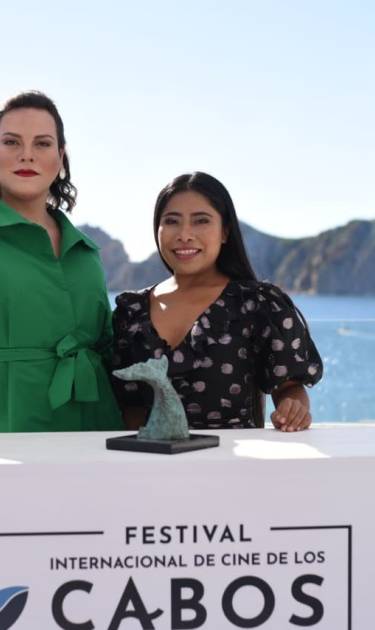There was one word both Yalitza Aparicio and Daniela Vega returned to time and time again during their conversation at Los Cabos International Film Festival: dignity. The Mexican actress, who earlier this year earned an Oscar nomination for Alfonso Cuarón’s Roma, and the star of Chile’s Oscar-winning film A Fantastic Woman were invited guests of the fest as part of its recently launched Mujeres Fantásticas initiative. During an all-too warm and sunny morning, the two took part in a conversation moderated by radio journalist Gabriela Warkentin where they touched on everything from their shared experiences as actresses who use their profiles to champion activist causes to the way they both hope to continue paving the way for all kinds of women to succeed in the film industry and beyond. But above all they talked at length about how the work they do comes down to one thing: uplifting women’s dignity in spaces where that’s a rare occurrence.
Whether working as a UNESCO Goodwill Ambassador for Indigenous Peoples (a role Aparicio shared she’s still figuring out) or producing a documentary about women who have survived armed conflicts (as Vega is currently doing alongside Garbage’s Shirley Manson), the two actresses have wasted no time in translating their big screen successes into tangible actions to fight toward gender equality. But as she continues navigating her post-Roma life and career, Aparicio has one plea: to not be pigeonholed. The success of that Cuarón film clearly opened doors for the young schoolteacher-turned-actress (and activist) but she still sees a dearth of roles being made available to women like herself. This is a systemic issue, she knows. “I never dreamed nor aspired to be in a film growing up, because I didn’t really see myself. When you never see yourself on the screen you can’t imagine being up there. You need to be seen.”
As one journalist put it during a Q & A session that followed their joint chat, both Aparicio and Vega have become de facto banner figures for their respective communities. And while that seemingly comes with added burdens to what the two actresses do for a living, both were quick to dismiss any concerns. “For me it’s just about living,” Vega noted. “And if it becomes about planting flags, well let it be about planting flags. But in reality it’s much more simple: this is a slice of time that you get to live out.”
Similarly, Aparicio shared how she’s grown more comfortable with being seen as a visible member of the indigenous community in Mexico. “Visibility doesn’t mean you’re alone,” she said. “That part of my identity is something I’m very proud of. I’m proud of being an indigenous woman. I’m proud of all I’ve lived through. So I’ve made a point of radiating that pride. And if that motivates people, all the better. But it’s not a burden. It’s not a heavy responsibility, it’s just all about sharing how proud you feel about who you are.”

That said, Vega, Aparicio and Warkentin pushed back into any simplistic narrative that makes it sound like this is a watershed moment for women. Protests in Mexico and Chile, after all, have clearly shown that there’s plenty of work still to be done. Moreover, as much progress as has been made, Vega wanted to make clear that we should qualify what feels new about the moment.
“What’s new is this phenomenon of sharing what’s happening. But indigenous women, trans women, women who choose to not have kids — all of us have been here for a long time. What’s happening is that we’ve been denied the ability to tell our stories for them to be validated. It’s not that there’s anything new but what’s new is that there are voices now being heard and there are eager ears open to listening to them.”
This conversation has been translated from Spanish by the author for Remezcla.





